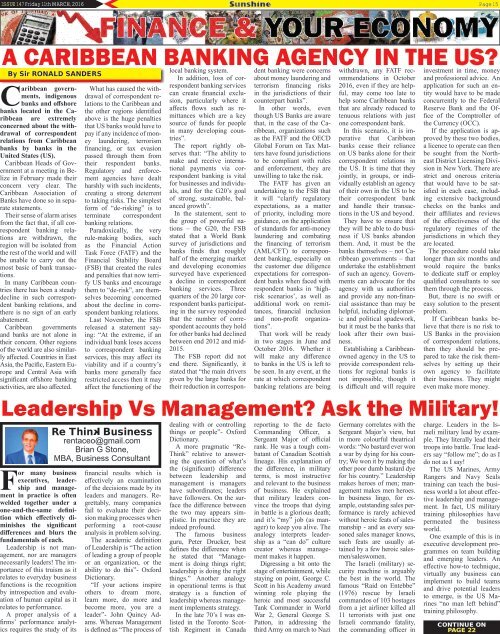RENTAL DEAL!
13oBuOATS
13oBuOATS
You also want an ePaper? Increase the reach of your titles
YUMPU automatically turns print PDFs into web optimized ePapers that Google loves.
ISSUE 147 Friday 11th MARCH, 2016<br />
Page 15<br />
A CARIBBEAN BANKING AGENCY IN THE US?<br />
By Sir RONALD SANDERS<br />
Caribbean governments,<br />
indigenous<br />
banks and offshore<br />
anks located in the Caibbean<br />
are extremely<br />
oncerned about the withrawal<br />
of correspondent<br />
elations from Caribbean<br />
anks by banks in the<br />
nited States (US).<br />
Caribbean Heads of Government<br />
at a meeting in Belize<br />
in February made their<br />
concern very clear. The<br />
Caribbean Association of<br />
Banks have done so in separate<br />
statements.<br />
Their sense of alarm arises<br />
from the fact that, if all correspondent<br />
banking relations<br />
are withdrawn, the<br />
region will be isolated from<br />
the rest of the world and will<br />
be unable to carry out the<br />
most basic of bank transactions.<br />
In many Caribbean countries<br />
there has been a steady<br />
decline in such correspondent<br />
banking relations, and<br />
there is no sign of an early<br />
abatement.<br />
Caribbean governments<br />
and banks are not alone in<br />
their concern. Other regions<br />
of the world are also similarly<br />
affected. Countries in East<br />
Asia, the Pacific, Eastern Europe<br />
and Central Asia with<br />
significant offshore banking<br />
activities, are also affected.<br />
What has caused the withdrawal<br />
of correspondent relations<br />
to the Caribbean and<br />
the other regions identified<br />
above is the huge penalties<br />
that US banks would have to<br />
pay if any incidence of money<br />
laundering, terrorism<br />
financing, or tax evasion<br />
passed through them from<br />
their respondent banks.<br />
Regulatory and enforcement<br />
agencies have dealt<br />
harshly with such incidents,<br />
creating a strong deterrent<br />
to taking risks. The simplest<br />
form of “de-risking” is to<br />
terminate correspondent<br />
banking relations.<br />
Paradoxically, the very<br />
rule-making bodies, such<br />
as the Financial Action<br />
Task Force (FATF) and the<br />
Financial Stability Board<br />
(FSB) that created the rules<br />
and penalties that now terrify<br />
US banks and encourage<br />
them to “de-risk”, are themselves<br />
becoming concerned<br />
about the decline in correspondent<br />
banking relations.<br />
Last November, the FSB<br />
released a statement saying:<br />
“At the extreme, if an<br />
individual bank loses access<br />
to correspondent banking<br />
services, this may affect its<br />
viability and if a country’s<br />
banks more generally face<br />
restricted access then it may<br />
affect the functioning of the<br />
Re Thin Business<br />
rentaceo@gmail.com<br />
Brian G Stone,<br />
MBA, Business Consultant<br />
dent banking were concerns<br />
about money laundering and<br />
terrorism financing risks<br />
in the jurisdictions of their<br />
counterpart banks”.<br />
In other words, even<br />
though US Banks are aware<br />
that, in the case of the Caribbean,<br />
organizations such<br />
as the FATF and the OECD<br />
Global Forum on Tax Matters<br />
have found jurisdictions<br />
to be compliant with rules<br />
and enforcement, they are<br />
unwilling to take the risk.<br />
The FATF has given an<br />
undertaking to the FSB that<br />
it will “clarify regulatory<br />
expectations, as a matter<br />
of priority, including more<br />
guidance, on the application<br />
of standards for anti-money<br />
laundering and combating<br />
the financing of terrorism<br />
(AML/CFT) to correspondent<br />
banking, especially on<br />
the customer due diligence<br />
expectations for correspondent<br />
banks when faced with<br />
respondent banks in ‘highrisk<br />
scenarios’, as well as<br />
additional work on remittances,<br />
financial inclusion<br />
and non-profit organizations”.<br />
That work will be ready<br />
in two stages in June and<br />
October 2016. Whether it<br />
will make any difference<br />
to banks in the US is left to<br />
be seen. In any event, at the<br />
rate at which correspondent<br />
banking relations are being<br />
local banking system.<br />
In addition, loss of correspondent<br />
banking services<br />
can create financial exclusion,<br />
particularly where it<br />
affects flows such as remittances<br />
which are a key<br />
source of funds for people<br />
in many developing countries”.<br />
The report rightly observes<br />
that: “The ability to<br />
make and receive international<br />
payments via correspondent<br />
banking is vital<br />
for businesses and individuals,<br />
and for the G20’s goal<br />
of strong, sustainable, balanced<br />
growth”.<br />
In the statement, sent to<br />
the group of powerful nations<br />
– the G20, the FSB<br />
stated that a World Bank<br />
survey of jurisdictions and<br />
banks finds that roughly<br />
half of the emerging market<br />
and developing economies<br />
surveyed have experienced<br />
a decline in correspondent<br />
banking services. Three<br />
quarters of the 20 large correspondent<br />
banks participating<br />
in the survey responded<br />
that the number of correspondent<br />
accounts they hold<br />
for other banks had declined<br />
between end 2012 and mid-<br />
2015.<br />
The FSB report did not<br />
end there. Significantly, it<br />
stated that “the main drivers<br />
given by the large banks for<br />
their reduction in corresponwithdrawn,<br />
any FATF recommendations<br />
in October<br />
2016, even if they are helpful,<br />
may come too late to<br />
help some Caribbean banks<br />
that are already reduced to<br />
tenuous relations with just<br />
one correspondent bank.<br />
In this scenario, it is imperative<br />
that Caribbean<br />
banks cease their reliance<br />
on US banks alone for their<br />
correspondent relations in<br />
the US. It is time that they<br />
jointly, in groups, or individually<br />
establish an agency<br />
of their own in the US to be<br />
their correspondent bank<br />
and handle their transactions<br />
in the US and beyond.<br />
They have to ensure that<br />
they will be able to do business<br />
if US banks abandon<br />
them. And, it must be the<br />
banks themselves – not Caribbean<br />
governments – that<br />
undertake the establishment<br />
of such an agency. Governments<br />
can advocate for the<br />
agency with us authorities<br />
and provide any non-financial<br />
assistance than may be<br />
helpful, including diplomatic<br />
and political spadework,<br />
but it must be the banks that<br />
look after their own business.<br />
Establishing a Caribbeanowned<br />
agency in the US to<br />
provide correspondent relations<br />
for regional banks is<br />
not impossible, though it<br />
is difficult and will require<br />
investment in time, money<br />
and professional advice. An<br />
application for such an entity<br />
would have to be made<br />
concurrently to the Federal<br />
Reserve Bank and the Office<br />
of the Comptroller of<br />
the Currency (OCC).<br />
If the application is approved<br />
by these two bodies,<br />
a licence to operate can then<br />
be sought from the Northeast<br />
District Licensing Division<br />
in New York. There are<br />
strict and onerous criteria<br />
that would have to be satisfied<br />
in each case, including<br />
extensive background<br />
checks on the banks and<br />
their affiliates and reviews<br />
of the effectiveness of the<br />
regulatory regimes of the<br />
jurisdictions in which they<br />
are located.<br />
The procedure could take<br />
longer than six months and<br />
would require the banks<br />
to dedicate staff or employ<br />
qualified consultants to see<br />
them through the process.<br />
But, there is no swift or<br />
easy solution to the present<br />
problem.<br />
If Caribbean banks believe<br />
that there is no risk to<br />
US Banks in the provision<br />
of correspondent relations,<br />
then they should be prepared<br />
to take the risk themselves<br />
by setting up their<br />
own agency to facilitate<br />
their business. They might<br />
even make more money.<br />
Leadership Vs Management? Ask the Military!<br />
For many business<br />
executives, leadership<br />
and management<br />
in practice is often<br />
welded together under a<br />
one-and-the-same definition<br />
which effectively diminishes<br />
the significant<br />
differences and blurs the<br />
fundamentals of each.<br />
Leadership is not management,<br />
nor are managers<br />
necessarily leaders! The importance<br />
of this truism as it<br />
relates to everyday business<br />
functions is the recognition<br />
by introspection and evaluation<br />
of human capital as it<br />
relates to performance.<br />
A proper analysis of a<br />
firms’ performance analytics<br />
requires the study of its<br />
financial results which is<br />
effectively an examination<br />
of the decisions made by its<br />
leaders and managers. Regrettably,<br />
many companies<br />
fail to evaluate their decision<br />
making processes when<br />
performing a root-cause<br />
analysis in problem solving.<br />
The academic definition<br />
of Leadership is “The action<br />
of leading a group of people<br />
or an organization, or the<br />
ability to do this”- Oxford<br />
Dictionary.<br />
“If your actions inspire<br />
others to dream more,<br />
learn more, do more and<br />
become more, you are a<br />
leader”- John Quincy Adams.<br />
Whereas Management<br />
is defined as “The process of<br />
dealing with or controlling<br />
things or people”- Oxford<br />
Dictionary.<br />
A more pragmatic “Re-<br />
Think” relative to answering<br />
the question of what’s<br />
the (significant) difference<br />
between leadership and<br />
management is managers<br />
have subordinates; leaders<br />
have followers. On the surface<br />
the difference between<br />
the two may appears simplistic.<br />
In practice they are<br />
indeed profound.<br />
The famous business<br />
guru, Peter Drucker, best<br />
defines the difference when<br />
he stated that “Management<br />
is doing things right;<br />
leadership is doing the right<br />
things.” Another analogy<br />
in operational terms is that<br />
strategy is a function of<br />
leadership whereas management<br />
implements strategy.<br />
In the late 70’s I was enlisted<br />
in the Toronto Scottish<br />
Regiment in Canada<br />
reporting to the de facto<br />
Commanding Officer, a<br />
Sergeant Major of official<br />
rank. He was a tough combatant<br />
of Canadian Scottish<br />
lineage. His explanation of<br />
the difference, in military<br />
terms, is most instructive<br />
and relevant to the business<br />
of business. He explained<br />
that military leaders convince<br />
the troops that dying<br />
in battle is a glorious death;<br />
and it’s “my” job (as manager)<br />
to keep you alive. The<br />
analogy interprets leadership<br />
as a “can do” culture<br />
creator whereas management<br />
makes it happen.<br />
Digressing a bit onto the<br />
stage of entertainment, while<br />
staying on point, George C.<br />
Scott in his Academy award<br />
winning role playing the<br />
heroic and most successful<br />
Tank Commander in World<br />
War 2, General George S.<br />
Patton, in addressing the<br />
third Army on march to Nazi<br />
Germany correlates with the<br />
Sergeant Major’s view, but<br />
in more colourful theatrical<br />
words: “No bastard ever won<br />
a war by dying for his country;<br />
We won it by making the<br />
other poor dumb bastard dye<br />
for his country.” Leadership<br />
makes heroes of men; management<br />
makes men heroes.<br />
In business lingo, for example,<br />
outstanding sales performance<br />
is rarely achieved<br />
without heroic feats of salesmanship<br />
- and as every seasoned<br />
sales manager knows,<br />
such feats are usually attained<br />
by a few heroic salesmen/saleswomen.<br />
The Israeli (military) security<br />
machine is arguably<br />
the best in the world. The<br />
famous “Raid on Entebbe”<br />
(1976) rescue by Israeli<br />
commandos of 103 hostages<br />
from a jet airliner killed all<br />
11 terrorists with just one<br />
Israeli commando fatality,<br />
the commanding officer in<br />
charge. Leaders in the Israeli<br />
military lead by example.<br />
They literally lead their<br />
troops into battle. True leaders<br />
say “follow me”; do as I<br />
do not as I say!<br />
The US Marines, Army<br />
Rangers and Navy Seals<br />
training can teach the business<br />
world a lot about effective<br />
leadership and management.<br />
In fact, US military<br />
training philosophies have<br />
permeated the business<br />
world.<br />
One example of this is in<br />
executive development programmes<br />
on team building<br />
and emerging leaders. An<br />
effective how-to technique,<br />
virtually any business can<br />
implement to build teams<br />
and drive potential leaders<br />
to emerge, is the US Marines<br />
“no man left behind”<br />
training philosophy.<br />
CONTINUE ON<br />
PAGE 22




